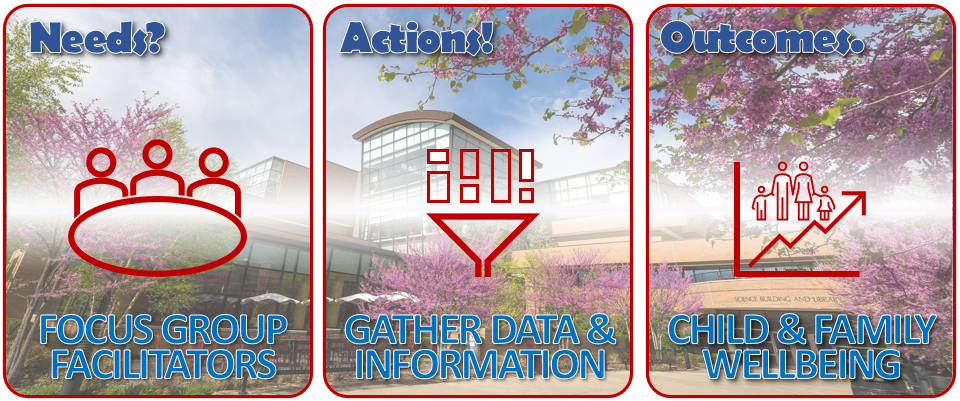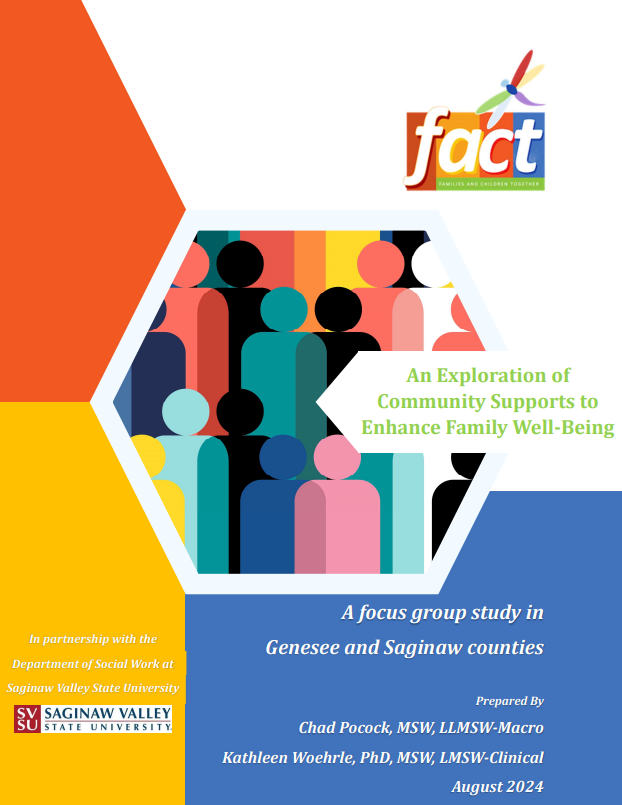
Results and Evaluation
Similar CBC Prevention programs have proven results in other parts of the country and we are watching closely
Strengthening Families
FACT (Families and Children Together) is a community-based nonprofit organization dedicated to strengthening families and preventing the need for child welfare involvement. Since our founding in 2021, we have focused on building a diverse and robust community network, geared towards resources and supports for families in Genesee and Saginaw Counties. From Community Service Hubs in Flint and Saginaw, 989 Reads Literacy program, caregiver dinners, community events, and FACT On The Go! Mobile Resource Unit, each is designed to reduce isolation, support caregivers, and advocate for child safety and the opportunity to thrive.
Our mission is simple and direct: FACT is investing in the safety and well-being of children and families through building community, providing support, and promoting advocacy. We believe families are the experts in their own lives, and our role is to walk alongside them. FACT is creating opportunities for connection, reinforcing the Five Protective Factors, and ensuring no family has to face challenges alone. FACT (Families and Children Together) is a community-based nonprofit organization dedicated to strengthening families and preventing the need for child welfare involvement. Since our founding in 2021, we have focused on building a diverse and robust community network, geared towards resources and supports for families in Genesee and Saginaw Counties. From Community Service Hubs in Flint and Saginaw, 989 Reads Literacy program, caregiver dinners, community events, and FACT On The Go! Mobile Resource Unit, each is designed to reduce isolation, support caregivers, and advocate for child safety and the opportunity to thrive.
Our mission is simple and direct: FACT is investing in the safety and well-being of children and families through building community, providing support, and promoting advocacy. We believe families are the experts in their own lives, and our role is to walk alongside them. FACT is creating opportunities for connection, reinforcing the Five Protective Factors, and ensuring no family has to face challenges alone.
Resources & Referrals
FACT has supported 514 unique families and 826 total children in coordinating referrals and resources to ensure each family remains healthy and at home together. Of the families served in this program, 11% had previous or current CPS or foster care involvement. The extensive coordination of resources supported 89% of our families by addressing their critical needs, such as securing housing and food, thus attributing to the prevention of CPS and foster care.
FACT On The Go takes essential resources into community neighborhoods where families live and gather. Using a mobile unit, our team distributes concrete goods for families in strategic geographic points in need. FACT On The Go! has supported more than 4,600 individuals with goods such as cleaning supplies, personal hygiene items, and other personal products. This increases access for families that may otherwise have transportation barriers to ensure that all families have access to the items that keep them healthy and strong in their very own community.
Caregiver Dinners & Community Events
FACT On The Go!
Mobile Resource Unit
Since the launch of the first Caregiver Dinner in July 2024, over 1,500 individuals have attended various community events coordinated by FACT. Caregiver dinners serve as opportunities to share a meal with their family and others in the community, enjoy an activity together, and provide Positive Childhood Experiences. Each community event has helped build community, increase social connections, and expand the protective factors of each family in attendance.
Community Service Hubs
FACT’s Community Service Hubs in Genesee and Saginaw Counties are safe, welcoming, trauma-informed spaces where families and organizations gather to connect, share resources, and access essential support. The Hubs offer an office extension of partner agencies to increase accessibility to services for the families they serve. Over 2,150 individuals have utilized the Community Service Hubs to utilize local resources and become connected to services that can support their families, therefore preventing crises from occurring.
Return on Investment
Based on a 2024 study by Chapin Hall, the annual cost of a child in foster care is estimated to be $32,711. Utilizing FY 2025 MDHHS Prevention data, FACT has determined that 117 total children served by FACT were involved in a previous CPS investigation in Genesee and Saginaw counties. The total cost in servicing these children and families is estimated to be $3,827,187 if they were placed in foster care. This amount grows substantially for each child serviced by FACT that did not have any CPS involvement. Therefore, it is inferred that the significant costs associated with foster care were avoided by connecting our families to the resources they need before more intrusive interventions were needed. In addition to considering that 89% of the completed goals at FACT were completed within 30 days, FACT’s approach to foster care prevention has demonstrated to be an efficient means of strengthening families and preventing crises from occurring.
Concrete Support Assistance
989Reads
Since the inception of 989Reads in April 2025, FACT’s Education Liaison has built and supported this Literacy Center model built on the love of reading that strengthens family learning for nearly 600 children in Saginaw County. This includes personalized education support for children and caregivers through school partnerships with Saginaw Public Schools, Bridgeport Schools, Mackinaw Alternative High School, and Success Academy. Mobile Mondays have happened monthly for the past 6 months. We have connected with nearly 300 children to promote literacy and have access to participating community providers.
Lunch And Learns meet monthly with our education community partners to identify and execute opportunities for collaboration. This has helped to yield many referrals to support families with varying needs pertaining to education.
In June 2025, FACT was provided a unique opportunity to assist families with their concrete needs. A total of 349 applications were processed by FACT within three months to prevent evictions and utility shut offs, help families receive basic items such as clothing and school supplies, and access transportation to help children get to school and their parents obtain stable employment. FACT supported many families whom were on the verge of being homeless or having their children become involved in foster care after recent CPS calls. The applications that were processed helped families overcome significant barriers and increase their well-being by addressing their basic needs.
In FY2025, FACT had collective impact on over10,000 individuals across Genesee and Saginaw counties. Below is a breakdown of each program’s impact.
HOW DOES FACT MEASURE OUTCOMES?
Facilitate IRB-approved focus groups to ensure family voices guide FACT’s work
Collect and analyze data to inform future planning and program design
Measure long-term improvements in child and family well-being.
FACT and Saginaw Valley State University’s School of Social Work are in their third year of partnership, conducting an IRB-approved study to evaluate FACT’s Community-Based Care model. This collaboration uses focus groups, data analysis, and community input to understand what families need most and how local systems can respond more effectively.
Through this ongoing, long-term study, FACT and SVSU are tracking real outcomes for children and caregivers over time. The research measures changes in family stability, access to resources, and overall well-being, ensuring that FACT’s programs remain data-driven, community-informed, and focused on long-term prevention.
An
Exploration
of Community Supports to Enhance Family
Well-Being
2024

Together, we can strengthen families, through the community, for the community
DONATE TODAY
You and your help will make coordinating care possible and help save families.






